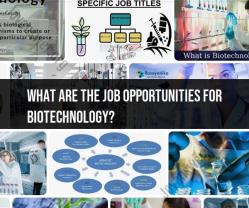What jobs are there in biotechnology?
Biotechnology offers a wide range of job options and roles across various sectors, including pharmaceuticals, healthcare, agriculture, environmental science, and research. Here are some of the most common jobs in biotechnology:
Research Scientist:
- Research scientists in biotechnology conduct experiments, analyze data, and contribute to scientific discoveries. They work on projects related to drug development, genetic engineering, and molecular biology.
Biotechnologist:
- Biotechnologists work on the development of biotechnological products and processes. They may be involved in genetic research, cell culture, and the production of biopharmaceuticals.
Biomedical Engineer:
- Biomedical engineers design and create medical devices, equipment, and systems. They work on projects related to prosthetics, medical imaging, and healthcare technology.
Clinical Research Associate (CRA):
- CRAs oversee clinical trials and research studies, ensuring compliance with regulatory requirements and ethical standards. They work for pharmaceutical companies, research organizations, or clinical research firms.
Quality Control Analyst/Manager:
- Quality control professionals ensure that biotechnology products meet established quality standards and regulatory guidelines. They perform tests and inspections to validate product quality.
Bioinformatics Specialist:
- Bioinformatics specialists use computational tools and algorithms to analyze biological data, such as DNA sequences, for research and drug development.
Regulatory Affairs Specialist/Manager:
- Regulatory affairs professionals ensure that biotechnology products comply with government regulations and safety standards. They assist with product approvals and submissions to regulatory agencies.
Sales and Marketing Representative:
- Sales and marketing professionals promote biotechnology products to healthcare providers, researchers, and pharmaceutical companies. They play a critical role in product adoption and market expansion.
Biotech Entrepreneur:
- Entrepreneurs in biotechnology start their own companies to develop and commercialize innovative products, therapies, or technologies.
Pharmaceutical Sales Representative:
- Pharmaceutical sales representatives sell pharmaceutical and biotech products to healthcare professionals, educating them about medication benefits.
Biomanufacturing Technician:
- Biomanufacturing technicians work in biopharmaceutical manufacturing facilities to produce biotechnology products, such as vaccines, antibodies, and recombinant proteins.
Clinical Laboratory Technician/Technologist:
- Clinical lab technicians and technologists perform diagnostic tests and experiments in clinical laboratories, contributing to patient care and biotechnology research.
Environmental Biotechnologist:
- Environmental biotechnologists use biotechnology to address environmental issues, such as pollution control, waste management, and sustainable resource utilization.
Food and Agricultural Scientist:
- Scientists in this field use biotechnology to enhance crop production, improve food quality, and develop new agricultural technologies.
Teaching and Academia:
- Many biotechnologists pursue careers in education and academia, becoming professors, lecturers, or researchers at universities and research institutions.
Biochemist/Biophysicist:
- Biochemists and biophysicists study the chemical and physical properties of living organisms and biological processes. They often work in research and development.
Clinical Trial Manager:
- Clinical trial managers oversee the planning and execution of clinical trials, ensuring they meet regulatory requirements and timelines.
Pharmacologist:
- Pharmacologists study the effects of drugs and chemicals on biological systems and may work in pharmaceutical research or regulatory affairs.
These are just a few examples of the diverse job options available in the field of biotechnology. The industry is constantly evolving, and new roles emerge as technology advances and our understanding of biology expands. Careers in biotechnology can be rewarding and impactful, making it a dynamic and exciting field to consider.
Career Options in Biotechnology: Exploring Diverse Job Roles
Biotechnology is a rapidly growing field with a wide range of career options. Biotechnologists work in a variety of industries, including pharmaceuticals, healthcare, agriculture, food and beverage, and environmental science.
Here are some examples of diverse job roles in biotechnology:
- Biotechnologists: Biotechnologists use their knowledge of biology and technology to develop and produce new products and processes. They may work in research and development, quality control, or manufacturing.
- Biomedical engineers: Biomedical engineers design and develop medical devices and implants. They may work in the healthcare industry or in the medical device industry.
- Microbiologists: Microbiologists study microorganisms, such as bacteria, viruses, and fungi. They may work in research and development, quality control, or food safety.
- Immunologists: Immunologists study the immune system and how it works. They may work in research and development, drug discovery, or clinical trials.
- Geneticists: Geneticists study genes and how they work. They may work in research and development, genetic testing, or personalized medicine.
In addition to these specific job roles, there are many other opportunities for biotechnologists in a variety of fields, including:
- Sales and marketing: Biotechnologists with experience in sales and marketing can work for biotechnology companies to sell products and services to customers.
- Regulatory affairs: Biotechnologists with knowledge of regulatory requirements can work for biotechnology companies to ensure that their products and services meet all applicable regulations.
- Business development: Biotechnologists with business acumen can work for biotechnology companies to develop new business opportunities and partnerships.
- Intellectual property: Biotechnologists with knowledge of intellectual property law can work for biotechnology companies to protect their patents and other intellectual property.
Biotechnology Job Spectrum: A Look at Career Possibilities
The biotechnology job spectrum is broad and includes a variety of positions at all levels of experience. From entry-level laboratory technicians to experienced research scientists, there is a place for everyone in the biotechnology industry.
Here is a look at the different types of biotechnology jobs available across the career spectrum:
- Entry-level jobs: Entry-level biotechnology jobs typically require a bachelor's degree in a related field, such as biology, chemistry, or biochemistry. Some common entry-level jobs include laboratory technician, research assistant, and quality control analyst.
- Mid-level jobs: Mid-level biotechnology jobs typically require a master's degree or PhD in a related field, as well as several years of experience in the industry. Some common mid-level jobs include research scientist, product development manager, and regulatory affairs specialist.
- Senior-level jobs: Senior-level biotechnology jobs typically require a PhD and several years of experience in a leadership position. Some common senior-level jobs include director of research, vice president of development, and chief scientific officer.
Building a Biotechnology Career: Your Path to Professional Success
There are many different paths to a successful career in biotechnology. Some people start their careers in research, while others start in industry. Some people go on to earn a PhD, while others choose to pursue a master's degree or even a bachelor's degree.
No matter what path you choose, there are a few things you can do to increase your chances of success in a biotechnology career:
- Get a strong education. A strong education in biology, chemistry, or biochemistry is essential for a career in biotechnology. If you are interested in research, you may also want to consider pursuing a PhD.
- Gain experience. Internships and research assistantships are a great way to gain experience in the biotechnology industry. You can also gain experience by volunteering in a laboratory or by working part-time in a biotechnology company.
- Network with people in the industry. Attend industry events and connect with people on LinkedIn. Networking is a great way to learn about new job opportunities and to meet potential mentors.
- Stay up-to-date on the latest trends and technologies. Read industry publications and attend industry events to stay informed about the latest developments in biotechnology.
Building a successful career in biotechnology takes time, effort, and dedication. But if you are passionate about science and technology, and you are willing to work hard, you can achieve your career goals.




